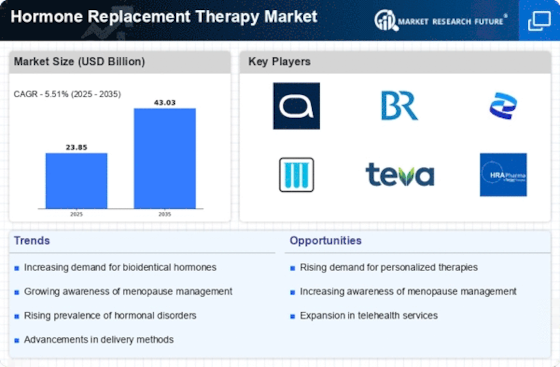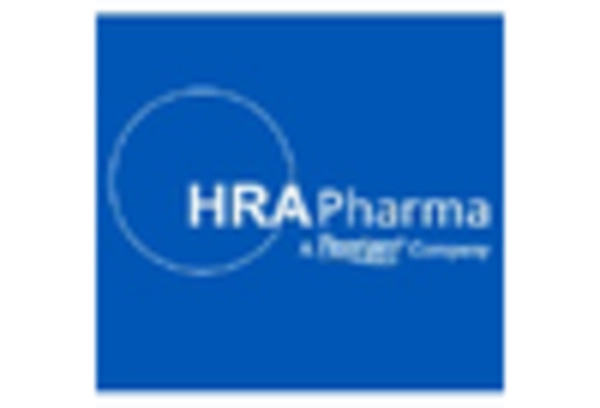Menopause Treatment
Hormonal Imbalance Treatment
Transgender Hormone Therapy
Age-Related Hormonal Decline
Estrogen
Testosterone
Progesterone
Thyroid Hormones
Oral
Transdermal
Injectable
Implantable
Hospitals
Outpatient Clinics
Home Care
North America
Europe
South America
Asia Pacific
Middle East and Africa
North America Outlook (USD Billion, 2019-2035)
Hormone Replacement Therapy Market by Application Type
Menopause Treatment
Hormonal Imbalance Treatment
Transgender Hormone Therapy
Age-Related Hormonal Decline
Hormone Replacement Therapy Market by Hormone Type
Estrogen
Testosterone
Progesterone
Thyroid Hormones
Hormone Replacement Therapy Market by Route of Administration Type
Oral
Transdermal
Injectable
Implantable
Hormone Replacement Therapy Market by End User Type
Hospitals
Outpatient Clinics
Home Care
Hormone Replacement Therapy Market by Regional Type
US
Canada
US Outlook (USD Billion, 2019-2035)
Hormone Replacement Therapy Market by Application Type
Menopause Treatment
Hormonal Imbalance Treatment
Transgender Hormone Therapy
Age-Related Hormonal Decline
Hormone Replacement Therapy Market by Hormone Type
Estrogen
Testosterone
Progesterone
Thyroid Hormones
Hormone Replacement Therapy Market by Route of Administration Type
Oral
Transdermal
Injectable
Implantable
Hormone Replacement Therapy Market by End User Type
Hospitals
Outpatient Clinics
Home Care
CANADA Outlook (USD Billion, 2019-2035)
Hormone Replacement Therapy Market by Application Type
Menopause Treatment
Hormonal Imbalance Treatment
Transgender Hormone Therapy
Age-Related Hormonal Decline
Hormone Replacement Therapy Market by Hormone Type
Estrogen
Testosterone
Progesterone
Thyroid Hormones
Hormone Replacement Therapy Market by Route of Administration Type
Oral
Transdermal
Injectable
Implantable
Hormone Replacement Therapy Market by End User Type
Hospitals
Outpatient Clinics
Home Care
Europe Outlook (USD Billion, 2019-2035)
Hormone Replacement Therapy Market by Application Type
Menopause Treatment
Hormonal Imbalance Treatment
Transgender Hormone Therapy
Age-Related Hormonal Decline
Hormone Replacement Therapy Market by Hormone Type
Estrogen
Testosterone
Progesterone
Thyroid Hormones
Hormone Replacement Therapy Market by Route of Administration Type
Oral
Transdermal
Injectable
Implantable
Hormone Replacement Therapy Market by End User Type
Hospitals
Outpatient Clinics
Home Care
Hormone Replacement Therapy Market by Regional Type
Germany
UK
France
Russia
Italy
Spain
Rest of Europe
GERMANY Outlook (USD Billion, 2019-2035)
Hormone Replacement Therapy Market by Application Type
Menopause Treatment
Hormonal Imbalance Treatment
Transgender Hormone Therapy
Age-Related Hormonal Decline
Hormone Replacement Therapy Market by Hormone Type
Estrogen
Testosterone
Progesterone
Thyroid Hormones
Hormone Replacement Therapy Market by Route of Administration Type
Oral
Transdermal
Injectable
Implantable
Hormone Replacement Therapy Market by End User Type
Hospitals
Outpatient Clinics
Home Care
UK Outlook (USD Billion, 2019-2035)
Hormone Replacement Therapy Market by Application Type
Menopause Treatment
Hormonal Imbalance Treatment
Transgender Hormone Therapy
Age-Related Hormonal Decline
Hormone Replacement Therapy Market by Hormone Type
Estrogen
Testosterone
Progesterone
Thyroid Hormones
Hormone Replacement Therapy Market by Route of Administration Type
Oral
Transdermal
Injectable
Implantable
Hormone Replacement Therapy Market by End User Type
Hospitals
Outpatient Clinics
Home Care
FRANCE Outlook (USD Billion, 2019-2035)
Hormone Replacement Therapy Market by Application Type
Menopause Treatment
Hormonal Imbalance Treatment
Transgender Hormone Therapy
Age-Related Hormonal Decline
Hormone Replacement Therapy Market by Hormone Type
Estrogen
Testosterone
Progesterone
Thyroid Hormones
Hormone Replacement Therapy Market by Route of Administration Type
Oral
Transdermal
Injectable
Implantable
Hormone Replacement Therapy Market by End User Type
Hospitals
Outpatient Clinics
Home Care
RUSSIA Outlook (USD Billion, 2019-2035)
Hormone Replacement Therapy Market by Application Type
Menopause Treatment
Hormonal Imbalance Treatment
Transgender Hormone Therapy
Age-Related Hormonal Decline
Hormone Replacement Therapy Market by Hormone Type
Estrogen
Testosterone
Progesterone
Thyroid Hormones
Hormone Replacement Therapy Market by Route of Administration Type
Oral
Transdermal
Injectable
Implantable
Hormone Replacement Therapy Market by End User Type
Hospitals
Outpatient Clinics
Home Care
ITALY Outlook (USD Billion, 2019-2035)
Hormone Replacement Therapy Market by Application Type
Menopause Treatment
Hormonal Imbalance Treatment
Transgender Hormone Therapy
Age-Related Hormonal Decline
Hormone Replacement Therapy Market by Hormone Type
Estrogen
Testosterone
Progesterone
Thyroid Hormones
Hormone Replacement Therapy Market by Route of Administration Type
Oral
Transdermal
Injectable
Implantable
Hormone Replacement Therapy Market by End User Type
Hospitals
Outpatient Clinics
Home Care
SPAIN Outlook (USD Billion, 2019-2035)
Hormone Replacement Therapy Market by Application Type
Menopause Treatment
Hormonal Imbalance Treatment
Transgender Hormone Therapy
Age-Related Hormonal Decline
Hormone Replacement Therapy Market by Hormone Type
Estrogen
Testosterone
Progesterone
Thyroid Hormones
Hormone Replacement Therapy Market by Route of Administration Type
Oral
Transdermal
Injectable
Implantable
Hormone Replacement Therapy Market by End User Type
Hospitals
Outpatient Clinics
Home Care
REST OF EUROPE Outlook (USD Billion, 2019-2035)
Hormone Replacement Therapy Market by Application Type
Menopause Treatment
Hormonal Imbalance Treatment
Transgender Hormone Therapy
Age-Related Hormonal Decline
Hormone Replacement Therapy Market by Hormone Type
Estrogen
Testosterone
Progesterone
Thyroid Hormones
Hormone Replacement Therapy Market by Route of Administration Type
Oral
Transdermal
Injectable
Implantable
Hormone Replacement Therapy Market by End User Type
Hospitals
Outpatient Clinics
Home Care
APAC Outlook (USD Billion, 2019-2035)
Hormone Replacement Therapy Market by Application Type
Menopause Treatment
Hormonal Imbalance Treatment
Transgender Hormone Therapy
Age-Related Hormonal Decline
Hormone Replacement Therapy Market by Hormone Type
Estrogen
Testosterone
Progesterone
Thyroid Hormones
Hormone Replacement Therapy Market by Route of Administration Type
Oral
Transdermal
Injectable
Implantable
Hormone Replacement Therapy Market by End User Type
Hospitals
Outpatient Clinics
Home Care
Hormone Replacement Therapy Market by Regional Type
China
India
Japan
South Korea
Malaysia
Thailand
Indonesia
Rest of APAC
CHINA Outlook (USD Billion, 2019-2035)
Hormone Replacement Therapy Market by Application Type
Menopause Treatment
Hormonal Imbalance Treatment
Transgender Hormone Therapy
Age-Related Hormonal Decline
Hormone Replacement Therapy Market by Hormone Type
Estrogen
Testosterone
Progesterone
Thyroid Hormones
Hormone Replacement Therapy Market by Route of Administration Type
Oral
Transdermal
Injectable
Implantable
Hormone Replacement Therapy Market by End User Type
Hospitals
Outpatient Clinics
Home Care
INDIA Outlook (USD Billion, 2019-2035)
Hormone Replacement Therapy Market by Application Type
Menopause Treatment
Hormonal Imbalance Treatment
Transgender Hormone Therapy
Age-Related Hormonal Decline
Hormone Replacement Therapy Market by Hormone Type
Estrogen
Testosterone
Progesterone
Thyroid Hormones
Hormone Replacement Therapy Market by Route of Administration Type
Oral
Transdermal
Injectable
Implantable
Hormone Replacement Therapy Market by End User Type
Hospitals
Outpatient Clinics
Home Care
JAPAN Outlook (USD Billion, 2019-2035)
Hormone Replacement Therapy Market by Application Type
Menopause Treatment
Hormonal Imbalance Treatment
Transgender Hormone Therapy
Age-Related Hormonal Decline
Hormone Replacement Therapy Market by Hormone Type
Estrogen
Testosterone
Progesterone
Thyroid Hormones
Hormone Replacement Therapy Market by Route of Administration Type
Oral
Transdermal
Injectable
Implantable
Hormone Replacement Therapy Market by End User Type
Hospitals
Outpatient Clinics
Home Care
SOUTH KOREA Outlook (USD Billion, 2019-2035)
Hormone Replacement Therapy Market by Application Type
Menopause Treatment
Hormonal Imbalance Treatment
Transgender Hormone Therapy
Age-Related Hormonal Decline
Hormone Replacement Therapy Market by Hormone Type
Estrogen
Testosterone
Progesterone
Thyroid Hormones
Hormone Replacement Therapy Market by Route of Administration Type
Oral
Transdermal
Injectable
Implantable
Hormone Replacement Therapy Market by End User Type
Hospitals
Outpatient Clinics
Home Care
MALAYSIA Outlook (USD Billion, 2019-2035)
Hormone Replacement Therapy Market by Application Type
Menopause Treatment
Hormonal Imbalance Treatment
Transgender Hormone Therapy
Age-Related Hormonal Decline
Hormone Replacement Therapy Market by Hormone Type
Estrogen
Testosterone
Progesterone
Thyroid Hormones
Hormone Replacement Therapy Market by Route of Administration Type
Oral
Transdermal
Injectable
Implantable
Hormone Replacement Therapy Market by End User Type
Hospitals
Outpatient Clinics
Home Care
THAILAND Outlook (USD Billion, 2019-2035)
Hormone Replacement Therapy Market by Application Type
Menopause Treatment
Hormonal Imbalance Treatment
Transgender Hormone Therapy
Age-Related Hormonal Decline
Hormone Replacement Therapy Market by Hormone Type
Estrogen
Testosterone
Progesterone
Thyroid Hormones
Hormone Replacement Therapy Market by Route of Administration Type
Oral
Transdermal
Injectable
Implantable
Hormone Replacement Therapy Market by End User Type
Hospitals
Outpatient Clinics
Home Care
INDONESIA Outlook (USD Billion, 2019-2035)
Hormone Replacement Therapy Market by Application Type
Menopause Treatment
Hormonal Imbalance Treatment
Transgender Hormone Therapy
Age-Related Hormonal Decline
Hormone Replacement Therapy Market by Hormone Type
Estrogen
Testosterone
Progesterone
Thyroid Hormones
Hormone Replacement Therapy Market by Route of Administration Type
Oral
Transdermal
Injectable
Implantable
Hormone Replacement Therapy Market by End User Type
Hospitals
Outpatient Clinics
Home Care
REST OF APAC Outlook (USD Billion, 2019-2035)
Hormone Replacement Therapy Market by Application Type
Menopause Treatment
Hormonal Imbalance Treatment
Transgender Hormone Therapy
Age-Related Hormonal Decline
Hormone Replacement Therapy Market by Hormone Type
Estrogen
Testosterone
Progesterone
Thyroid Hormones
Hormone Replacement Therapy Market by Route of Administration Type
Oral
Transdermal
Injectable
Implantable
Hormone Replacement Therapy Market by End User Type
Hospitals
Outpatient Clinics
Home Care
South America Outlook (USD Billion, 2019-2035)
Hormone Replacement Therapy Market by Application Type
Menopause Treatment
Hormonal Imbalance Treatment
Transgender Hormone Therapy
Age-Related Hormonal Decline
Hormone Replacement Therapy Market by Hormone Type
Estrogen
Testosterone
Progesterone
Thyroid Hormones
Hormone Replacement Therapy Market by Route of Administration Type
Oral
Transdermal
Injectable
Implantable
Hormone Replacement Therapy Market by End User Type
Hospitals
Outpatient Clinics
Home Care
Hormone Replacement Therapy Market by Regional Type
Brazil
Mexico
Argentina
Rest of South America
BRAZIL Outlook (USD Billion, 2019-2035)
Hormone Replacement Therapy Market by Application Type
Menopause Treatment
Hormonal Imbalance Treatment
Transgender Hormone Therapy
Age-Related Hormonal Decline
Hormone Replacement Therapy Market by Hormone Type
Estrogen
Testosterone
Progesterone
Thyroid Hormones
Hormone Replacement Therapy Market by Route of Administration Type
Oral
Transdermal
Injectable
Implantable
Hormone Replacement Therapy Market by End User Type
Hospitals
Outpatient Clinics
Home Care
MEXICO Outlook (USD Billion, 2019-2035)
Hormone Replacement Therapy Market by Application Type
Menopause Treatment
Hormonal Imbalance Treatment
Transgender Hormone Therapy
Age-Related Hormonal Decline
Hormone Replacement Therapy Market by Hormone Type
Estrogen
Testosterone
Progesterone
Thyroid Hormones
Hormone Replacement Therapy Market by Route of Administration Type
Oral
Transdermal
Injectable
Implantable
Hormone Replacement Therapy Market by End User Type
Hospitals
Outpatient Clinics
Home Care
ARGENTINA Outlook (USD Billion, 2019-2035)
Hormone Replacement Therapy Market by Application Type
Menopause Treatment
Hormonal Imbalance Treatment
Transgender Hormone Therapy
Age-Related Hormonal Decline
Hormone Replacement Therapy Market by Hormone Type
Estrogen
Testosterone
Progesterone
Thyroid Hormones
Hormone Replacement Therapy Market by Route of Administration Type
Oral
Transdermal
Injectable
Implantable
Hormone Replacement Therapy Market by End User Type
Hospitals
Outpatient Clinics
Home Care
REST OF SOUTH AMERICA Outlook (USD Billion, 2019-2035)
Hormone Replacement Therapy Market by Application Type
Menopause Treatment
Hormonal Imbalance Treatment
Transgender Hormone Therapy
Age-Related Hormonal Decline
Hormone Replacement Therapy Market by Hormone Type
Estrogen
Testosterone
Progesterone
Thyroid Hormones
Hormone Replacement Therapy Market by Route of Administration Type
Oral
Transdermal
Injectable
Implantable
Hormone Replacement Therapy Market by End User Type
Hospitals
Outpatient Clinics
Home Care
MEA Outlook (USD Billion, 2019-2035)
Hormone Replacement Therapy Market by Application Type
Menopause Treatment
Hormonal Imbalance Treatment
Transgender Hormone Therapy
Age-Related Hormonal Decline
Hormone Replacement Therapy Market by Hormone Type
Estrogen
Testosterone
Progesterone
Thyroid Hormones
Hormone Replacement Therapy Market by Route of Administration Type
Oral
Transdermal
Injectable
Implantable
Hormone Replacement Therapy Market by End User Type
Hospitals
Outpatient Clinics
Home Care
Hormone Replacement Therapy Market by Regional Type
GCC Countries
South Africa
Rest of MEA
GCC COUNTRIES Outlook (USD Billion, 2019-2035)
Hormone Replacement Therapy Market by Application Type
Menopause Treatment
Hormonal Imbalance Treatment
Transgender Hormone Therapy
Age-Related Hormonal Decline
Hormone Replacement Therapy Market by Hormone Type
Estrogen
Testosterone
Progesterone
Thyroid Hormones
Hormone Replacement Therapy Market by Route of Administration Type
Oral
Transdermal
Injectable
Implantable
Hormone Replacement Therapy Market by End User Type
Hospitals
Outpatient Clinics
Home Care
SOUTH AFRICA Outlook (USD Billion, 2019-2035)
Hormone Replacement Therapy Market by Application Type
Menopause Treatment
Hormonal Imbalance Treatment
Transgender Hormone Therapy
Age-Related Hormonal Decline
Hormone Replacement Therapy Market by Hormone Type
Estrogen
Testosterone
Progesterone
Thyroid Hormones
Hormone Replacement Therapy Market by Route of Administration Type
Oral
Transdermal
Injectable
Implantable
Hormone Replacement Therapy Market by End User Type
Hospitals
Outpatient Clinics
Home Care
REST OF MEA Outlook (USD Billion, 2019-2035)
Hormone Replacement Therapy Market by Application Type
Menopause Treatment
Hormonal Imbalance Treatment
Transgender Hormone Therapy
Age-Related Hormonal Decline
Hormone Replacement Therapy Market by Hormone Type
Estrogen
Testosterone
Progesterone
Thyroid Hormones
Hormone Replacement Therapy Market by Route of Administration Type
Oral
Transdermal
Injectable
Implantable
Hormone Replacement Therapy Market by End User Type
Hospitals
Outpatient Clinics
Home Care


















Leave a Comment